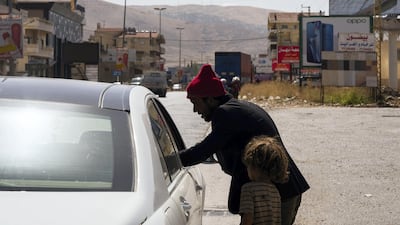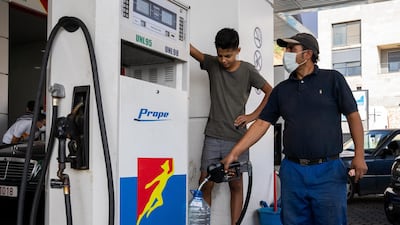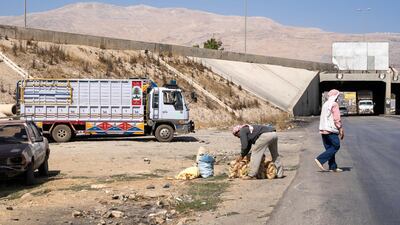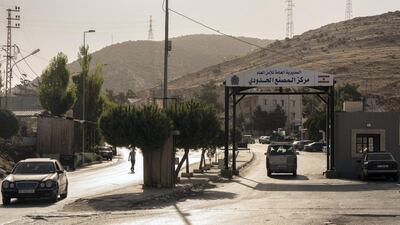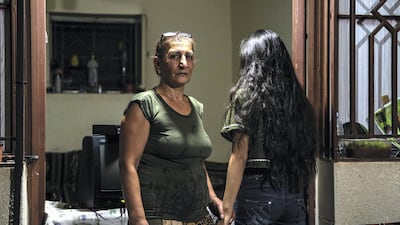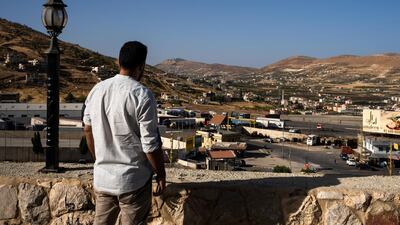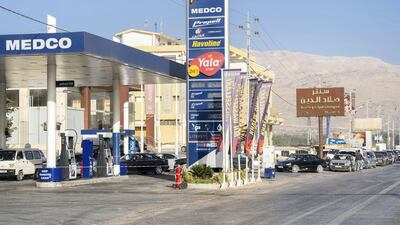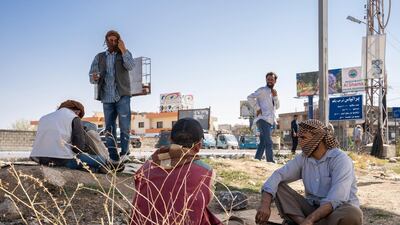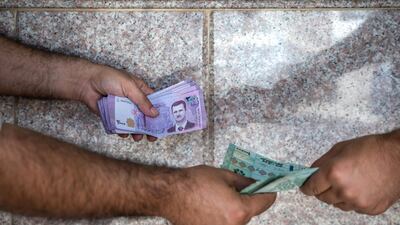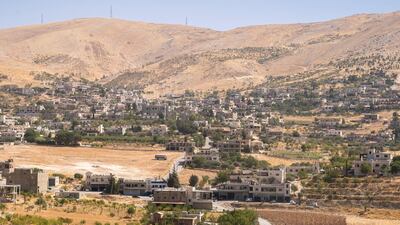Travellers are finding themselves trapped in a no-man's-land between the borders of Syria and Lebanon as a result of poor co-ordination and communication.
At the Masnaa border crossing, hundreds are employing smugglers to get them back over the border into Lebanon after short trips to Syria were unexpectedly extended by unscheduled border closures.
Christine and her aunt slept on the side of a road in the open air for four nights after being refused entry to Syria in late August.
The family is of Syrian origin and settled in the Masnaa region of Lebanon for 30 years – Christine was born on this side of the border in the 1990s.
"I had to renew my identity papers to be able to register at university for the autumn school year," Christine told The National.
"So I went to the Lebanese checkpoint and crossed as usual. Except that after paying for the $100 PCR test required by the Syrian authorities to enter the country, we were told the border was closed.
“But when we tried to go back, the soldiers stopped us, as Lebanon refuses Syrian citizens to come, allegedly because of [Covid-19]."
Christine and her aunt were not alone, she said. About 200 other people were stuck with them. Taxi drivers stationed at the border say the situation has been going on since the end of June.
The UN refugee agency in Lebanon said a first wave of about 1,000 Syrians became trapped in the no-man's-land after their government closed its side of the border to anyone arriving from Lebanon.
Having tried to cross illegally, they were stopped by the Syrian army. Many tried again, passing through in small groups after waiting for several weeks in terrible conditions.
“We didn't plan to be travelling for more than a few hours: we had little change of clothes, no water and no food. We were paying the Syrian soldiers up to 500 Syrian lira for a sandwich," Christine said.
In a country where the average monthly salary of a civil servant is $25, spending about $1 for a sandwich is an expense few can afford.
Running out of money and knowing that they would also have had to pay for a week's isolation in a hotel had they crossed, Christine and her aunt resolved to use the services of a smuggler named Ghiyad to return to Lebanon illegally.
The journey cost them two million Lebanese pounds ($1,330), putting the single-income family into debt – her mother's domestic job brings in 450,000 pounds per month.
UNHCR said that since September, the border closures have been random and because Lebanese authorities refuse to talk to the agency about them, there could still be several hundred people in the area without access to help.
Ghiyad is experienced in the art of smuggling people and black-market goods over the border into Lebanon, and business has been booming.
In this part of the Beqaa and all along the Damascus road, the trafficking of goods and people is an open secret, seen but not spoken about.
The black market has been of use to more people than usual since March, because the borders have closed sporadically to halt the spread of coronavirus. People such as Christine have been forced to pay smugglers for their services.
"The currency crisis in Lebanon, the Caesar sanctions in Syria and now the Covid. This period is the worst we've had," Christine's mother, Joelle, said.
"Much worse than when the war was at its highest in 2013, or 2014 in Ghouta."
Samir Aita, a Syrian economist, and consultant for the head of the Arab Economists Circle, said the risk of starvation was real.
"This is a massive humanitarian crisis," he said.
Prices are increasing and alternative ways to get essential goods out of the subsidised market are flourishing.
It is not simply people being clandestinely taken across the border into Lebanon. Some items move in the other direction.
Hussein, a service driver in Beqaa, is confronted with petrol shortages almost daily.
"The Syrians buy it [at a] much more expensive [price], so the government regularly stops supplying Beqaa, to prevent dealers from smuggling it, instead of serving it to the Lebanese," he said.
According to Ghiyad, 20 litres of petrol is worth 26,000 pounds in Lebanon and 126,000 pounds in Syria; diesel that costs 16,800 pounds in Lebanon is sold for 120,000 Lebanese pounds on the Syrian side.
“Every crisis has its beneficiaries," a high-ranking government official in Beirut said.
"One reason why some have welcomed the Caesar sanctions against Damascus is that they profit from the illegal ecosystem throughout this border region. With, as always, losers and winners."
Among the latter, there are not only Lebanese. Some Syrians who left because of the war have ensured a profitable existence.
Mohammed Abdallah is mayoral clerk in the Lebanese village of Saadnayel, about 15 minutes from the Syrian border.
He said the situation only fed his resentment. "We have been dealing with all these refugees who settled on large parts of the agricultural land and who have lowered the value of the labour," he said.
“Now we have to manage the consequences of the neighbouring crisis, while Lebanon is barely standing. I see whole trucks of goods leaving at dawn, I know that dozens of people smuggle daily, and it's always the same ones who build extensions to their villa from one day to the next. They get along very well with the Syrians.”
Regardless of nationality, the culture of corruption provides a formidable portfolio of opportunities – from the designated chief of an informal camp who collects taxes on every black-market exchange transaction up to the local businessman, claiming he promotes the common good by employing refugees to load smuggled trucks.
Ghiyad himself, who takes 900,000 pounds per adult for a journey by night, said he believed he was helping people – "sort of" like an NGO, before answering one of the phones he uses to co-ordinate his network of smugglers – and was "a job provider".
